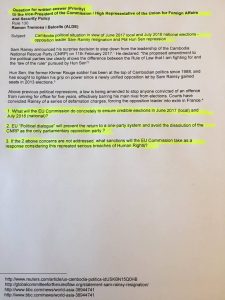Rainsy’s Resignation Begins New Chapter
As the article “Rainsy Quits Amid Threat, But CNRP Still in Danger” (February 13) notes, Sam Rainsy resigned as president of the CNRP to save his party from dissolution at the hands of Prime Minister Hun Sen-with commune election coming in June and the national election next year.
Academics see Mr. Hun Sen’s non-stop obsession to divide and weaken the CNRP as a pre-emptive tactic before the elections, ensuring his preferred outcome. His activities have surpassed all efforts to reform and destroyed what good might have come of it.
Mr. Rainsy has laid out an inclusive policy to include Cambodians overseas, especially millions of migrant workers, to be able to vote, as opposed to Mr. Hun Sen who has advocated to exclude them.
Apart from his personal integrity and genuine patriotism, Mr. Rainsy is clear and intelligent in handling political truces with Mr. Hun Sen. With more than 23 years experience in leading opposition party, his effort paid off in 2013. Seas of people gathered in tsunamic-like crowd to welcome him back home at the airport a few days prior to the national election, which the CNRP nearly won.
From now on, Mr. Rainsy will be an icon of change and idealistic pragmatism in Cambodia. His political career is not over. As long as Cambodian people, especially younger voters, remain supportive of his decadeslong struggle, his vision for Cambodia will cease to be a dream.
Sophan Seng is executive director of the Committee for Election Rights of Overseas Cambodians.

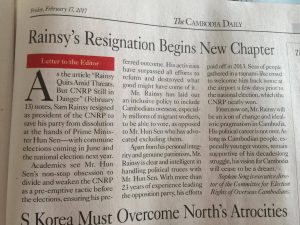
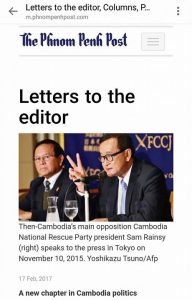 The most popular news during these few days is the
The most popular news during these few days is the 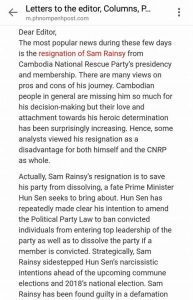 tactic to ensure a positive outcome for the CPP in elections. This activity has surpased all efforts of reform. Jailing NGO staff members including secretary of the National Election Committee Ny Charia is seen as an attempt to tame the election body, and this latest effort to outlaw the strongest opposition party is seen as a move to weaken his opponent before allowing them to enter the ring.
tactic to ensure a positive outcome for the CPP in elections. This activity has surpased all efforts of reform. Jailing NGO staff members including secretary of the National Election Committee Ny Charia is seen as an attempt to tame the election body, and this latest effort to outlaw the strongest opposition party is seen as a move to weaken his opponent before allowing them to enter the ring.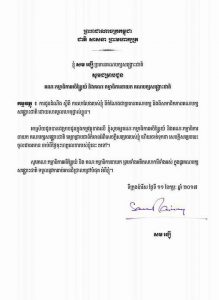 Actually, Sam Rainsy announced his resignation from party’s Presidency of CNRP this February 11, 2017 is to intentionally save his party from dissolving attempted by Prime Minister Hun Sen. Hun Sen had repeatedly warned on amending the political party law to ban convicted individuals from entering top leadership of the party as well as to dissolve the party from such convicted degree if found. Strategically, Sam Rainsy stepped ahead of Hun Sen’s authoritarianism and narcissism for the upcoming elections i.e. commune election 2017 and national election 2018. Sam Rainsy has been convicted by a defamation lawsuit against him and there are many lawsuits in row to trial him. Every Cambodian knows that those charges are politically motivated.
Actually, Sam Rainsy announced his resignation from party’s Presidency of CNRP this February 11, 2017 is to intentionally save his party from dissolving attempted by Prime Minister Hun Sen. Hun Sen had repeatedly warned on amending the political party law to ban convicted individuals from entering top leadership of the party as well as to dissolve the party from such convicted degree if found. Strategically, Sam Rainsy stepped ahead of Hun Sen’s authoritarianism and narcissism for the upcoming elections i.e. commune election 2017 and national election 2018. Sam Rainsy has been convicted by a defamation lawsuit against him and there are many lawsuits in row to trial him. Every Cambodian knows that those charges are politically motivated.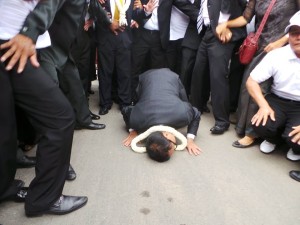 Beside of personal integrity, honesty, sacrifice and genuine patriotism for his nation, Sam Rainsy is vivid and intellectual in handling political truces with Hun Sen. With his over 27 years experience in political leadership as opposition party particularly competing with Hun Sen, his effort yielded in 2013 as the government effort to disqualify him from political leadership has impregnably backfired Hun Sen. Evidently, sea of people gathered in tsunamic-like crowd to welcome him back home at the airport few days before the election campaign in 2013, was a historic momentum.
Beside of personal integrity, honesty, sacrifice and genuine patriotism for his nation, Sam Rainsy is vivid and intellectual in handling political truces with Hun Sen. With his over 27 years experience in political leadership as opposition party particularly competing with Hun Sen, his effort yielded in 2013 as the government effort to disqualify him from political leadership has impregnably backfired Hun Sen. Evidently, sea of people gathered in tsunamic-like crowd to welcome him back home at the airport few days before the election campaign in 2013, was a historic momentum.